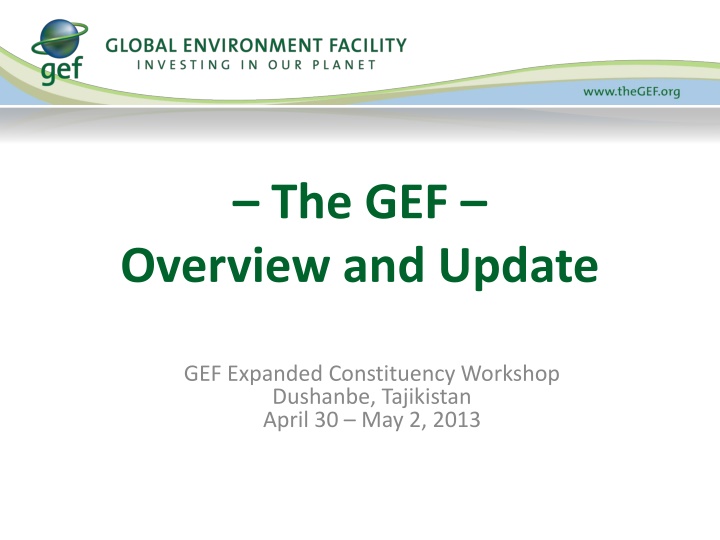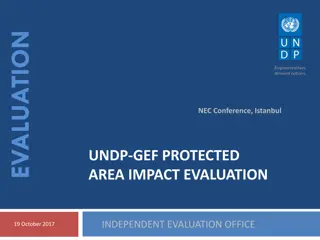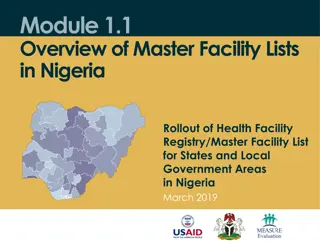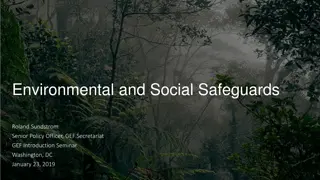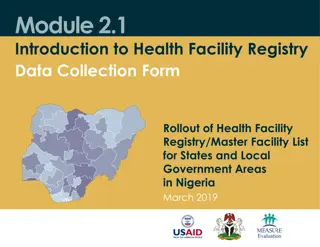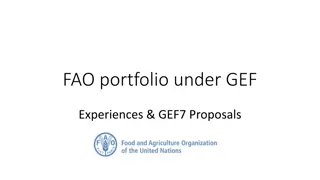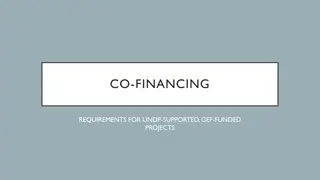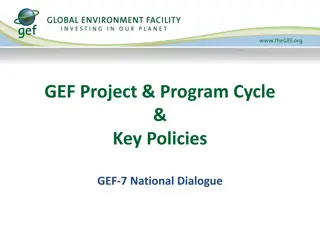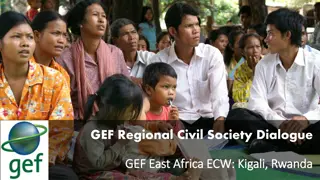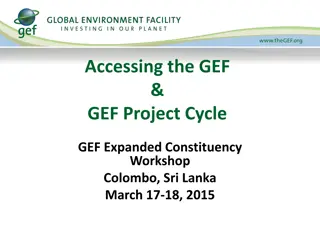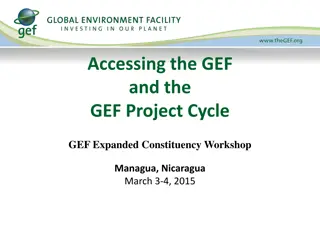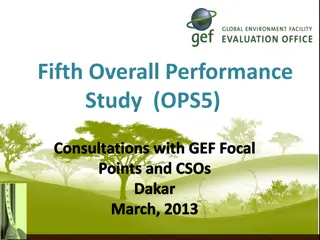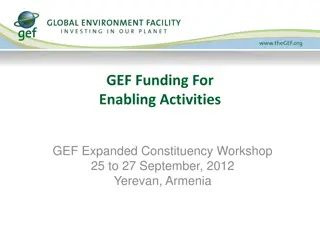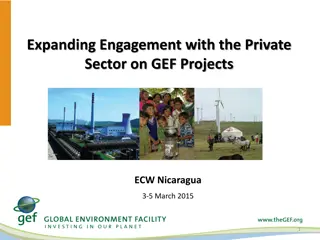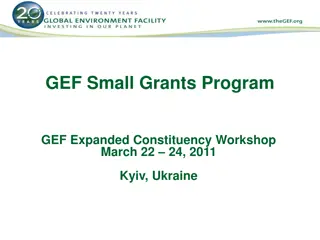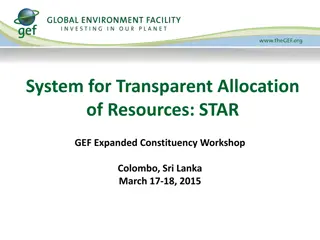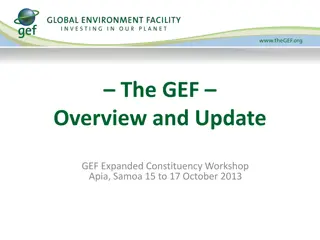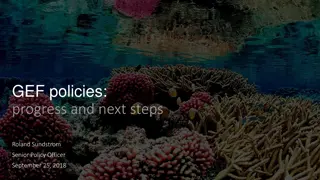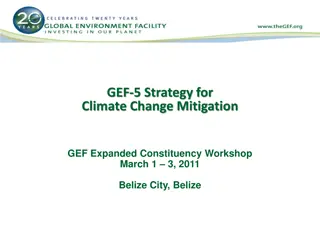Overview of Global Environment Facility (GEF): History, Structure, and Responsibilities
Global Environment Facility (GEF) is a pivotal financial mechanism supporting environmental projects worldwide. Established in 1991, GEF plays a crucial role in addressing global environmental issues through partnerships with various agencies. GEF agencies are responsible for project oversight, management, and delivery of outcomes. The GEF-5 allocation and utilization details for countries like Armenia, Azerbaijan, Belarus, Kazakhstan, Kyrgyz Republic, Russian Federation, Tajikistan, Turkmenistan, and Uzbekistan are also highlighted.
Download Presentation

Please find below an Image/Link to download the presentation.
The content on the website is provided AS IS for your information and personal use only. It may not be sold, licensed, or shared on other websites without obtaining consent from the author.If you encounter any issues during the download, it is possible that the publisher has removed the file from their server.
You are allowed to download the files provided on this website for personal or commercial use, subject to the condition that they are used lawfully. All files are the property of their respective owners.
The content on the website is provided AS IS for your information and personal use only. It may not be sold, licensed, or shared on other websites without obtaining consent from the author.
E N D
Presentation Transcript
The GEF Overview and Update GEF Expanded Constituency Workshop Dushanbe, Tajikistan April 30 May 2, 2013
History of the GEF 1992 2013 1991 1994 $1 billion pilot program in the WB GEF serves as financial mechanism for: CBD UNFCCC Stockholm Conv. on POPs UNCCD Mercury (NEW) At the Rio Earth Summit, negotiations started to restructure the GEF out of the WB World s largest public funder of projects and programs to benefit the global environment Instrument for the Establishment of the Restructured GEF Also, although not linked formally to the Montreal Protocol, the GEF supports its implementation in transition economies. Initial partners: WB, UNDP, UNEP
GEF Trust Fund Institutional Framework Guidance Operations Action GEF Trustee STAP GEF Assembly Projects Countries: GEF OFPs / PFPs Convention FPs Other Gov t Agencies NGOs / CSOs Private Sector GEF Council Countries: Council Members / Constituencies GEF GEF Agencies UNDP UNEP WB ADB AfDB EBRD FAO IaDB IFAD UNIDO Secretariat Conventions CBD UNFCCC Stockholm (POPs) UNCCD Montreal Protocol Mercury Evaluation Office
Responsibility of GEF Agencies (1 of 2) Implementing Agency Project Oversight Ensure quality of preparation Disburse funds to Executing Agency Supervise implementation Be accountable to GEF Council Keep GEF OFP informed Help secure committed co-financing
Responsibility of GEF Agencies (2 of 2) Executing Agency Project Management Deliver project outcomes Day-to-day management of funds Report on results and use of funds
GEF-5 GEF-5 Allocation Utilized (M US$) PIFs cleared by CEO awaiting approval (M US$) US$4.25B n Replenishment STAR Allocations STAR Envelopes (M US$) CC BD LD Total Total Total Flexible Country 0 5,94 Yes Armenia 2 1,5 2,44 5,94 0 7,35 No Azerbaijan 6,52 1,5 3,46 11,48 2,2 11,88 No 0,5 Belarus 9,56 1,5 11,56 0 15,28 No 5,09 Kazakhstan 15,49 4,7 25,34 0 6,18 Yes 3,05 Kyrgyz Republic 2 1,5 6,5 11,3 49,56 No Russian Federation 87,01 24,37 8,18 119,56 0 5,94 Yes Tajikistan 2 1,5 2,44 5,94 0 0,24 Yes Turkmenistan 5,4 1,7 3,27 10,37 0,5 16,99 No Uzbekistan 12,77 1,65 4,98 19,4
GEF Project Cycle Streamlining Measures 1. PPG included in PIF template 2. MSP ceiling - $2 million 3. All templates simplified 4. Milestones monitored by GEFSEC 5. Agency fees: 40% at Council approval 60% at CEO endorsement 6. Umbrella projects for EAs approved by Council No separate endorsement for individual projects.
Harmonization Oct 2012: WB Harmonization Pilot discussion starts with the WB Objective To reduce administrative burden through involvement of GEF s Program Managers in project design. What has been harmonized 1)No Parallel Process for Decision Making 2)No GEF Review Sheets 3)No GEF-specific Project Templates 4)New business standard: from a 10 to a 5-day response
Broadening the GEF Partnership GEF Council May 2011: Approval of a pilot to accredit up to 10 new institutions to serve as GEF Project Agencies At least 5 national institutions with size and regional balance Eligibility: national institutions, regional organizations, CSOs/NGOs, UN specialized agencies and programs, other int l organizations
New GEF Fee Policy Start Date The Council requested the Secretariat to begin implementation of the new structure beginning 01 Jan 2013. Percentages All projects approved/cleared by CEO will be subject to the new fee policy as follows: 9.5% for GEF project grants up to and including $10 million 9.0% for GEF project grants above $10 million
GEF-6 Replenishment (1 of 3) Replenishment: process in which donor countries, every 4 years, voluntarily pledge to provide resources to fund the GEF operations. Previous Replenishments
GEF-6 Replenishment (2 of 3) Composition GEF Trustee (Chair) GEF CEO (Co-Chair) Donors: Minimum contribution SDR 4 M Recipients: 4 representatives (representing AFR, Asia/Pacific, ECA, and LAC) CSOs/NGOs: 2 representatives Observers: A) Potential donors B) GEF Agencies C) Conventions
GEF-6 Replenishment (3 of 3) Process: Timetable April 2013 (Paris) Sept. 2013 (TBD) Nov. 2013 (Washington) Feb. 2014 (TBD) Core Documents Documents Strategic Positioning Programming Policy GEF2020 Strategy OPS5 (GEFEO)
SELECTED QUESTIONS FOR GEF-6 TO MAXIMIZE GEF S FUTURE IMPACT How could GEF move towards a more program based approach? How can the GEF support more focused and impactful projects? What is GEF s role in climate finance in view of the evolving global finance architecture and changing demands? How can the GEF continue to remain at the forefront of innovation? How should the GEF seek to enhance its results-based management and knowledge management to facilitate replication and scale-up?
How should the GEF seek to enhance its results-based management and knowledge management to facilitate replication and scale-up? How should the GEF s engagement in Middle Income Countries evolve? Should the GEF review its current resource allocation system? Should the GEF consider introducing alternative and more innovative financing models? Should the GEF consider rebalancing resource allocation among focal areas?
Thank you for your attention! Questions? The Global Environment Facility 1818 H Street, NW, Mail Stop P4-400 - Washington, DC 20433 USA Tel: (202) 473-0508 Fax: (202) 522-3240/3245 www.thegef.org / secretariat@thegef.org
